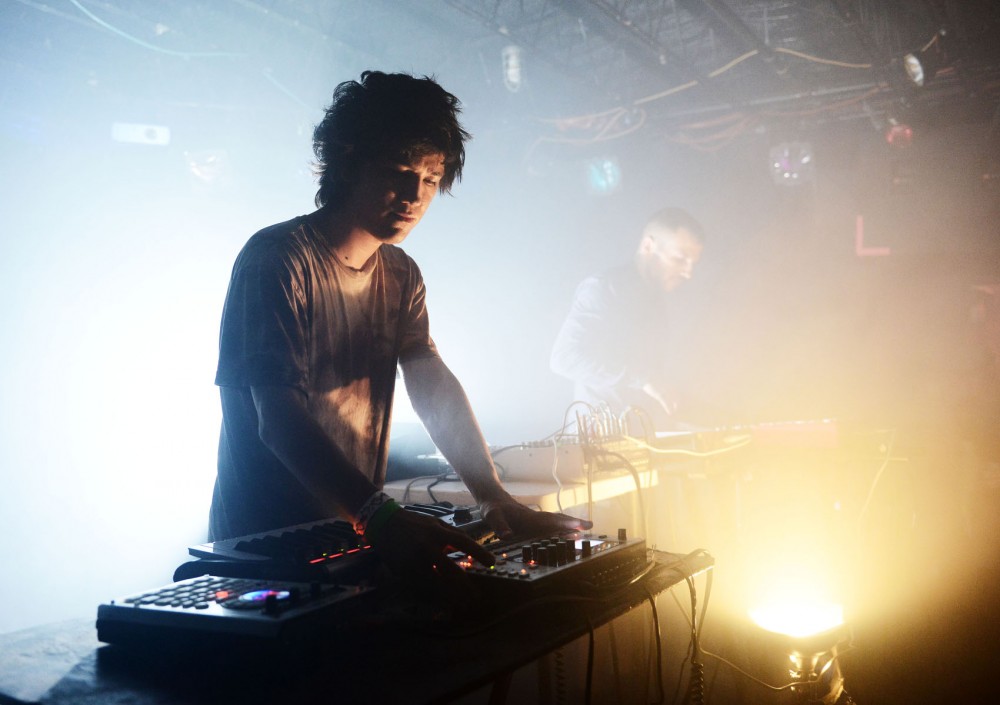The Brooklyn-based electronic duo Teengirl Fantasy played the 7th Street Entry last Friday night, showcasing their rare ability of making danceable music you can do homework to.
Logan Takahashi and Nick Weiss mixed songs live behind a thick cloud of smoke and in front of a punishing strobe light. Lush, sedated synth tones warped into ear piercing melodies while erratic but driving beats pulsed beneath.
The Oberlin grads cracked Pitchfork’s Top 100 Songs of 2010 with “Cheaters” and are now back with their second album “Tracer.” After the show, A&E sat down to talk with Takahashi and Weiss.
So what are you doing now?
Nick Weiss: We drove here all night from New York, so we’ll probably just go sleep. Last time we played Minneapolis, though, we went to a really funny house party in St. Paul. Like some psych-trance rave in the suburbs. This girl took us there. We played with Crystal Castles and their audience is pretty crazy, so yeah.
Logan Takahashi: Much younger crowd than ours, I think. Kind of Hot Topic-y.
When you started, were you more interested in playing live or recording?
Weiss: We didn’t start with any set goals; we were just jamming. We didn’t think we’d ever tour or anything.
Takahashi: We both had previous interests with recording music, but we formed this project specifically to play a house party in college.
Weiss: It was really fun. Actually, it didn’t go well. We used a laptop, and that was the only time we’ve done that, and it just didn’t work. So we kept playing the same song over and over. But no one noticed. Everyone had a great time.
Kind of like tonight. You mentioned there was some technical difficulty.
Takahashi: Yeah my gear was just [expletive] up. Not that anyone would know.
Weiss: With electronics, it’s really hard for the audience to know what exactly is going on. But it is pretty live. We play all the synths. There’s no backing track. When we press a button, a sound comes out, you know? If people can’t see us or have no idea about what we do, they’ll call us DJs, but we’re really not DJs.
It seems like a lot of people lump all electronic music together, but it is really diverse.
Weiss: The response [to the new album] is really interesting to see. I guess electronic music is having a moment with reviewers that didn’t think about it before. So there’s a lot of people asking us about EDM [electronic dance music]. But that’s like Skrillex and Avicii and whatever. It’s so far removed from what we do. Like super mainstream dance music. But it’s interesting and maybe cool that people think that we would have an opinion on it. Or call our album an album of EDM.
It must be weird to have people not be able to distinguish that music from yours.
Weiss: I’m not saying any of it’s bad, or making a value judgment. But the goals of someone making music like that — it’s mostly about excitement and adrenaline.
There are points in your set that are about that, too.
Weiss: Oh, yeah. Of course. We just reach it in a different way.
Takahashi: That stuff is closer to like Bon Jovi than us. But as an electronic musician, or whatever, I think it is cool that somebody like Skrillex can get five Grammys right now.
Did you record “Tracer” with different intentions than you had on your first album?
Weiss: We just thought more about it, period. With the first one we were a lot less self-critical and didn’t have the experience of having done an album before. This time we thought more about sequencing and stuff.
Takahashi: The main thing with this was having the flow of the songs really work as a whole piece.
One of my favorite songs of the last few years is “Commercial,” a song you did with Das Racist.
Weiss: We were in China when we gave that beat to them.
Takahashi: We recorded it in the summer in my mom’s basement. It was supposed to be for someone else, some other singer.
Weiss: They didn’t use it and we loved the instrumental. And Das Racist are really cool guys, so it worked out.
Takahashi: It would be sweet to do more rap production.
You don’t worry about, like, losing ownership of the song by doing that?
Weiss: I don’t care about that at all. I feel that way with some of the collaborations on the album, too. Like the song with Kelela, her voice is so strong and she’s a new artist; it kind of gave her a chance to have a moment. And now she’s working with all these other producers that are friends of ours. That’s an awesome thing that can come out of working with people.














